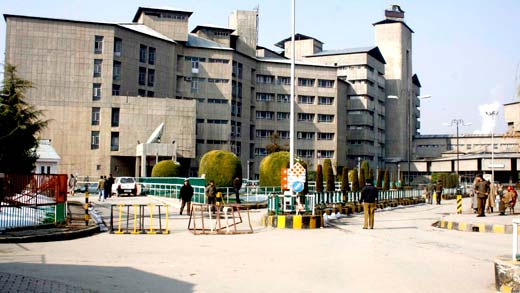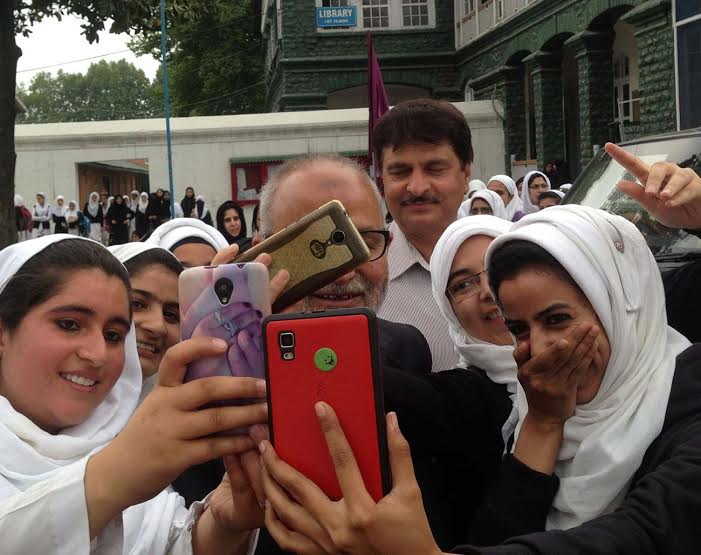by YounisKaloo
Barring nurses’ counter, the lone doctor on the night shift in the Emergency Ward of Sher-I-Kashmir Institute of Medical Sciences (SKIMS) Soura ordered the lights out at 1 am. The patients, mostly accompanied by more than one attendant, and who all had needles put in their veins for injecting fluids and medicines, lay asleep. It looked more of an induced sleep than natural; given the pain, they would give vent to through moans and cries.

Azam, almost 17 years of age, was sleeping on a locomotive bed near the counter, woke up immediately after the lights were turned off, as with them the fan, feeding him cold air, clinging to a column came to a stop. Despite the July heat at its peak, the air conditioners installed in the ward were turned on neither during the day nor the night. Maybe, the doctors knew what temperature suited the patients, some of whom were in critical conditions.
Azam began to feel uneasy, repeatedly turning sides. His elder sister, Zohra, who had decided to doze off a little after standing guard over her brother since their arrival at the hospital a day before. She had intentionally outstretched her legs on a steel bar at the base of the bed to sense any movement of her brother and act in case he falls down or if he needs something. Unable to find out whether her brother is asleep or not, given his raccoon eyes, Zohra asks him if he needs anything. Azam can’t talk as he has five stitches inside his mouth, so he gently lifts his right hand and points at the fan.
Zohra quickly rushes to the counter, where the doctor is talking to an attendant who wants him to see the accompanying patient. She keeps looking back several times to see if her brother has moved or changed to other direction.
“Doctor, that fan over there is not working while the rest in the ward are running. My brother can’t sleep,” Zohra requests politely, shifting her eyes between the doctor and her brother’s bed.
“We have to turn off the lights so that patients can sleep,” replied the doctor
“But they still have fans running. Only my brother’s fan is not working.”
“This is the protocol. I can’t help it.”
“What do I do now? If he stays awake, he will again feel the pain in his broken wrist, which is yet to be plastered, in the forehead where the bone underneath is fractured, and the many stitches around his head. He is critical. He was referred to this hospital from SKIMS Bemina in case his condition, God forbid, deteriorates,” explains Zohra, using the language of her hands to add more weight to her arguments, her eyes already moist.
“You can go to the Control Room. Maybe they can help,” said the doctor, at last, to get rid of the pleading girl.
Distraught Zohra returns to her brother’s bed to inform Azam that she will be going out of the Emergency ward to the Control Room, which is not far from the ward. She advises him against moving much and assures she will be back in a few minutes. Azam is barely able to respond. He gestures away his sister with the right hand, which he has lifted to his fractured nose as the pack in his nostrils is irritating him.
Inside the Control Room, to her surprise, Zohra finds several men in the same fatigues seated in the chairs set in an L-shape around a desk, all awake and talking. She addresses no one in particular as she finds it hard to keep up with several eyes, all looking at her.
The man in the only chair across the desk replies in a louder voice, implying he is the authority in the room, “It is the way to get in? By the way, it is already a quarter to two. It will soon be cold there”. Not having the luxury of time to plead, Zohra runs back to her brother’s bed. She takes out an X-ray sheet from many of them tucked in the envelope of the CT-Scan sheet and begins to wave it back and forth over her brother’s face, which had beads of sweat on the nose bridge and over eyebrows.
Half-an-hour passes, but Azam is unable to sleep again, and Zohra’s exhausted body does do not allow her to continue fanning. She makes Azam lay completely on his back and checks if the short arches on both the sides of the bed are raised to prevent the fall.
“I am taking you out. It is nice and cold out there. Don’t move,” Zohra says in her brother’s ears.
Slowly, without disturbing the other patient’s bed, she pushes Azam’s bed. To navigate it without hurting his broken wrist, she alternately switches the ends of the bed and reaches the entrance gate of the hospital. The difference in the temperature is palpable. Holding on the bed firmly, she allows the gravity to do its work to take the bed down the slope onto the flat pavement. With her feet, she brings down the bed’s wheel-clips and searches for a brick or a stone to keep the bed from moving. Along with a half-brick, she comes with a stretcher also and places it alongside her brother. It is one of the stretchers that carried several patients during the day with different injuries and ailments. Some were bleeding from multiple wounds profusely, staining the stretchers. Zohra falls asleep, least bothered that the stretcher has blood on it.
(Younis also is a Journalism Post Graduate)
Photographs used in this opinion are purely representational.















